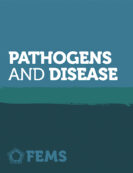FEMS Yeast Research Poster Prize: Valentina del Olmo Toledo
We send our congratulations to Valentina del Olmo Toledo, who won the best poster prize at the 9th Advanced Lecture Course on Human Fungal Pathogens. This award is sponsored by our journal FEMS Yeast Research.
 The 9th Advanced Lecture Course on Human Fungal Pathogens (FEBS2022) was held on the 14-20 May 2022 in France. This was a FEMS Sponsored Event and FEMS supported Early Career Researchers with travel grants to attend this course.
The 9th Advanced Lecture Course on Human Fungal Pathogens (FEBS2022) was held on the 14-20 May 2022 in France. This was a FEMS Sponsored Event and FEMS supported Early Career Researchers with travel grants to attend this course.
Read our interview with Valentina about her research below:
What is your current position, and what was your scientific journey to get there?
I am currently part of the Comparative Genomics group led by Toni Gabaldón, affiliated to both the Barcelona Supercomputing Center (BSC) and the Biomedical Research Institute (IRB) in Barcelona. I did most of my training in Germany, I obtained a MSc degree at the Heinrich-Heine-Universität of Düsseldorf and then moved on to do my PhD work at the Institute of Molecular Infection Biology (IMIB) in Würzburg (Germany). There, as part of Christian Pérez’s group, I studied the evolution of transcriptional regulatory networks in the fungal pathogen Candida albicans.”
Could you describe the research your poster covered?
I am interested in how pathogenic fungal lineages emerge and particularly in the role that hybridisation plays in this process. Hybridisation is common in yeasts and often leads to genomic variability and adaptation. Candida orthopsilosis is a human-associated opportunistic pathogen and most clinical isolates are hybrids resulting from crosses between two parental lineages of which only one has been identified. The rare presence or total absence of parentals amongst clinical isolates is hypothesised to be a consequence of a reduced pathogenicity with respect to their hybrids. In my poster, I presented the genome analysis of the first sequenced environmental C. orthopsilosis strains, which were isolated from warm marine ecosystems. I found that the majority of environmental isolates are hybrids, and that these are phylogenetically closely related to hybrid clinical isolates. Furthermore, I identified the long-sought missing parental lineage, thus providing a complete overview of the genomic evolution of this species. The results suggest a marine origin of C. orthopsilosis hybrids and pave the way to identifying the pre-existing environmental adaptations that rendered hybrids more prone to colonising and infecting the mammalian host.”
What do you hope to focus your research on in the future?
I am currently fascinated by these pathogenic hybrid yeasts and I would like to continue contributing to expand the knowledge on fungal hybrid species. There are still many aspects of their genomes, ecology and evolution that are not yet understood, as well as numerous parental lineages that remain to be discovered.”
–
We use income from the FEMS Journals to fund grants, awards, and projects, and to support our knowledge sharing events and initiatives. Consider publishing your research with our journals to help the global microbiology community.
All but one of the FEMS journals are now fully open access (OA), with one journal, FEMS Microbiology Letters remaining a subscription journal with free-to-publish and OA options. Open access is key to supporting the FEMS mission of disseminating high quality research as widely as possible: when high quality, peer reviewed sound science is open access, anyone, anywhere in the world with an internet connection, can read it.







